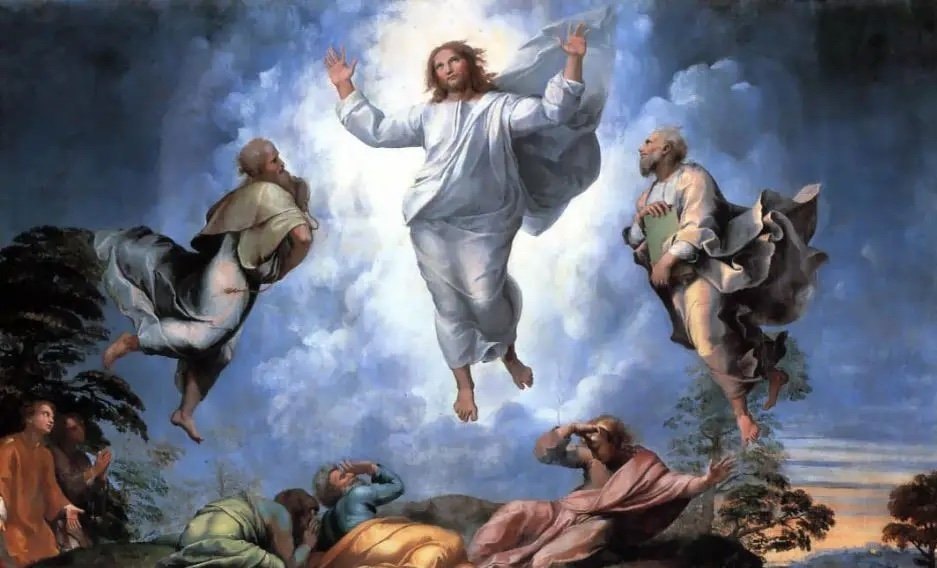Mark 9:1-13
In this week’s reading of the Gospel of Mark, Mark 9:1-13 recounts the Transfiguration of Jesus. Here are a few key points to this passage:
1. The Promise of the Kingdom of God (Verse 1)
Jesus tells His disciples that some of them will not taste death before they see the Kingdom of God come with power. This statement introduces the significance of the Transfiguration and underscores the imminent revelation of Jesus' divine glory.
2. The Transfiguration (Verses 2-8)
The Event: Six days after Jesus' promise, He takes Peter, James, and John up a high mountain where He is transfigured before them. His clothes become dazzlingly white, and His face shines.
Appearance of Moses and Elijah: Moses and Elijah appear and converse with Jesus, symbolizing the Law and the Prophets bearing witness to Him.
Peter's Reaction: Peter, overwhelmed and frightened, suggests building three shelters for Jesus, Moses, and Elijah.
The Divine Voice: A cloud overshadows them, and a voice from the cloud says, "This is my Son, whom I love. Listen to him!" This reaffirms Jesus' identity as the Son of God and emphasizes the importance of listening to His teachings.
Aftermath: Suddenly, only Jesus is seen with the disciples, and they descend the mountain.
3. Instructions on Silence (Verse 9)
Jesus instructs the disciples not to tell anyone about the Transfiguration until after He has risen from the dead. This highlights the need for the events to be understood in light of the resurrection.
4. The Question About Elijah (Verses 10-13)
Disciples' Confusion: The disciples discuss what "rising from the dead" means and then ask Jesus why the teachers of the law say Elijah must come first.
Jesus' Explanation: Jesus explains that Elijah does come first to restore all things and implies that John the Baptist fulfilled this role. He also indicates that just as Elijah suffered, the Son of Man (Jesus) will also suffer before His glory is fully revealed.
Jesus predicts that some disciples will witness the Kingdom of God coming in power. Six days later, He takes Peter, James, and John up a mountain, where He is transfigured, His appearance becoming dazzlingly white. Moses and Elijah appear, conversing with Him. Overwhelmed, Peter suggests building shelters for them. A cloud envelops them, and a divine voice declares Jesus as the beloved Son and commands the disciples to listen to Him. After the vision ends, Jesus instructs them to keep the experience secret until after His resurrection. The disciples question the role of Elijah, and Jesus explains that Elijah has come in the form of John the Baptist, who suffered as Jesus will also suffer.
Do you think the Kingdom of God has come? Is it near? Will we ever see it in our earthly life? These are very important questions Christian should be asking ourselves, especially with the recent push for Christian Nationalism. Christian Nationalism is unbiblical and here are just a few points:
Jesus’ Teachings on the Kingdom of God:
Spiritual Kingdom: Jesus spoke of a spiritual kingdom rather than a political one. He stated, "My kingdom is not of this world" (John 18:36). Christian nationalism, by focusing on earthly governance, contradicts this teaching.
Inclusive Message: Jesus’ message was inclusive, reaching out to all people regardless of nationality or ethnicity (Matthew 28:19-20). Christian nationalism, by prioritizing a particular nation, stands in contrast to this universal mission.
Love and Unity:
Great Commandment: Jesus emphasized loving God and loving one’s neighbor as oneself (Matthew 22:37-40). Christian nationalism can breed division and conflict, undermining this fundamental principle of love and unity.
Unity in Christ: Paul taught that in Christ, there is neither Jew nor Gentile, slave nor free (Galatians 3:28). Christian nationalism, which elevates national identity, contradicts the idea of unity in Christ.
Warnings Against Idolatry:
Idolatry of Nation: The Bible warns against idolatry in any form (Exodus 20:3-4). Placing national identity on par with or above faith in Christ can become a form of idolatry, where the nation is worshipped rather than God.
Justice and Mercy:
Biblical Justice: The Bible calls for justice and mercy (Micah 6:8). Christian nationalism can lead to policies that are unjust or lack compassion, especially towards outsiders and marginalized groups, contradicting biblical calls for justice and mercy.
Christian nationalism is problematic because it tends to exclude and divide, poses risks of authoritarianism, and contradicts democratic principles. Biblically, it is ungrounded as it conflicts with the teachings of Jesus about the spiritual nature of God’s kingdom, the universal and inclusive message of the gospel, the principles of love and unity, warnings against idolatry, and the call for justice and mercy.
In God’s grip,
Pastor Chuck Church
If you are reading the Gospel of Mark with Pastor Chuck this year, below is a short and simple guide to doing so for this week:
Prayer: Heavenly Father, your words expose my innermost thoughts and desires. I am an open book before you when I read your book. May your truths work as I read of your holiness, truth, and love. May the power of your word be known in my life so that I might genuinely have the abundant life you came to give. Amen.
Read: Mark 9:1-13
Questions to guide your thinking:
Understanding the Transfiguration:
What does the Transfiguration reveal about Jesus' divine nature and His relationship with God?
How do the appearances of Moses and Elijah connect the Old Testament to the New Testament?
Faith and Belief:
How does Jesus' prediction about His resurrection shape my understanding of faith and hope in the face of trials?
What significance does the Transfiguration hold in affirming Jesus' identity as the Messiah and the Son of God?
Understanding Suffering and Glory:
How do Jesus’ words about His forthcoming suffering and resurrection (and the role of Elijah/John the Baptist) help me understand the relationship between suffering and glory in the Christian faith?
In what ways does this passage challenge me to embrace or understand suffering in my journey of faith?
Community and Inclusion:
How can I ensure that my faith practice is inclusive and welcoming to others, reflecting the inclusive nature of Jesus' mission?
How does recognizing the importance of listening to Jesus shape my interactions and relationships within my community?
Biblical Interpretation:
How do I interpret the connection between the Old Testament figures (Moses and Elijah) and the New Testament revelation in Jesus?
What do the disciples' reactions (fear, confusion, questions) teach me about my own responses to spiritual experiences or revelations?
Historical and Cultural Context:
What can I learn about the historical and cultural context of the Transfiguration and its significance for early Christians?
How does understanding the context of this passage help me better grasp its meaning and implications?

